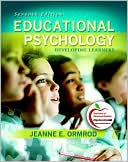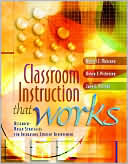Educational Psychology: Developing Learners
Search in google:
A focus on the core principles of educational psychology New! Instructional objectives have been added to each chapter to keep students’ reading on target. New! The book has been significantly streamlined to ensure that information is presented efficiently and accessibly. Principles and core concepts are summarized in Principles and Assumptions tables that also include educational implications and concrete examples (see page 184). Opportunities for readers to see those principles in action Experiencing Firsthand exercises help readers observe principles of educational psychology in themselves (see pages 26, 182, and 512). Developmental Trends tables summarize age-typical characteristics at four grade levels and offer suggested classroom strategies for each level (see pages 51, 198, and 516). Video examples allow students to explore the principles of educational psychology through the actions and words of children and adolescents (see pages 27, 186, and 541). Case studies and real artifacts help illustrate the principles of educational psychology using real-life examples (see pages 19, 33, and 195). Additional opportunities to apply the principles Into the Classroom and Creating a Productive Classroom Environment boxes suggest and illustrate strategies related to particular areas of concern for teachers (see pages 37, 44, 187, and 467). All chapters end with Practice for Your Licensure Exam exercises designed to resemble the kinds questions that appear on many teacher licensure tests. Suggested classroom strategies are illustrated with apple icons (see pages 38,188, and 509). New! Accompanying the book is an exciting new online resource, MyEducationLab, that provides readers with opportunities to apply the core principles and build their teaching skills (see pages 35, 47, 215).
Ch. 1Educational Psychology and Teacher Decision Making1Pt. IUnderstanding Student Development and DiversityCh. 2Cognitive and Linguistic Development18Ch. 3Personal, Social, and Moral Development60Ch. 4Individual and Group Differences102Ch. 5Students with Special Educational Needs142Pt. 2Understanding How Students LearnCh. 6Learning and Cognitive Processes186Ch. 7Knowledge Construction226Ch. 8Higher-Level Thinking Skills258Ch. 9Behaviorist Views of Learning298Ch. 10Social Cognitive Views of Learning332Ch. 11Motivation and Affect366Ch. 12Cognitive Factors in Motivation388Pt. 3Understanding Instructional ProcessesCh. 13Instructional Strategies426Ch. 14Creating and Maintaining a Productive Classroom Environment478Ch. 15Basic Concepts and Issues in Assessment510Ch. 16Classroom Assessment Strategies552App. ADescribing Relationships with Correlation CoefficientsApp. BAnalyses of the Ending Case StudiesApp. CMatching Book and Ancillary Content to the PRAXIS Principles of Learning and Teaching TestsGlossaryReferencesName IndexSubject Index








